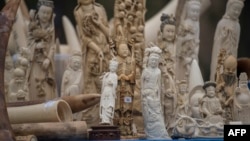A Tanzanian government minister described elephant poaching on Thursday as a national disaster, and urged China to curb its appetite for ivory.
The east African nation's elephant population shrank from around 110,000 in 2009 to a little over 43,000 in 2014, a fall of 60 percent, according to a census released this month, with conservation groups blaming industrial-scale poaching.
"We call upon the international community led by China to end its appetite for ivory," Lazaro Nyalandu, Tanzania's natural resources and tourism minister, told journalists at the launch of an anti-poaching awareness campaign.
Demand for ivory from fast-growing Asian economies such as China and Vietnam, where it is turned into jewels and ornaments, has led to a spike in poaching across Africa.
China, the world's biggest consumer of elephant tusks, announced in February a one-year ban on the import of African ivory carvings, but conservationists say corruption is fuelling poaching in Tanzania.
"Illegal ivory trade in and through Tanzania continues unabated despite repeated warnings and irrefutable evidence of the scale," Mary Rice, executive director of the London-based Environmental Investigation Agency, told Reuters.
"Chronic corruption in Tanzania throughout the trade chain, and particularly in the exit points and ports, is a key driver of the trade."
Nyalandu said Tanzania's rangers were overwhelmed by the scale of the poaching, though he also said there were suggestions that migration could account for falling numbers at some national parks.
"We have ordered a new elephant census to be carried out in August to validate the results of this latest survey," he said.
Nyalandu said poaching at safari parks was threatening the tourism industry, Tanzania's biggest foreign exchange earner.





